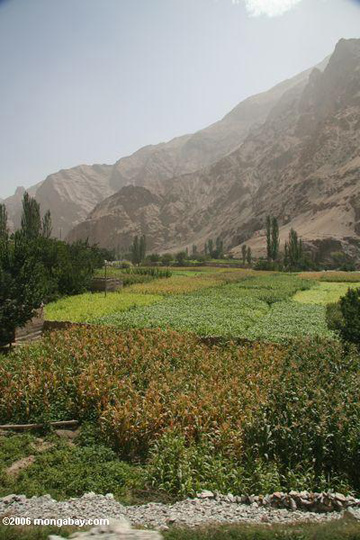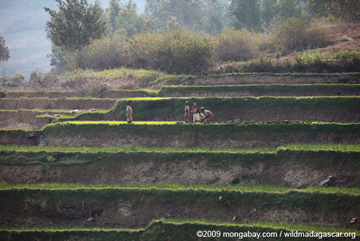‘Land grab’ fears in Africa legitimate
A new report by the International Institute for Environment and Development (IIED) has found that recent large-scale land deals in Africa are likely to provide scant benefit to some of the world’s poorest and most famine-prone nations and will probably create new social and environmental problems. Analyzing 12 recent land leasing contracts investigators found a number of concerns, including contracts that are only a few pages long, exclusion of local people, and in one case actually giving land away for free. Many of the contracts last for 100 years, threatening to separate local communities from the land they live on indefinitely.
“Most contracts for large-scale land deals in Africa are negotiated in secret,” explains report author Lorenzo Cotula in a press release. “Only rarely do local landholders have a say in those negotiations and few contracts are publicly available after they have been signed.”
The land-lease trend in Africa is recent. As prognosticators warn that food and water shortages, exacerbated by climate change and growing populations, will become the norm, rising nation such as China and South Korea have begun to purchase massive tracts of land from the world’s most destitute. In Africa this covers over 50 million hectares in countries like Sudan, Ethiopia, the Democratic Republic of Congo (DRC), Madagascar, Cameroon, Mozambique, Senegal, and Mali. In many cases the land is sold for a pittance: in Sudan land is being leased for $0.07 per hectare annually, while Mali has signed a contract that gives land away for free. Some of the contracts even include handing over water rights without fees. Ironically, such contracts have been drafted in already-arid nations threatened by desertification like Senegal and Sudan.
Why would any government sign such a deal? Desperate African nations hope to gain much-needed investment, expertise, development projects, and jobs. Yet, the IIED report warns that most of the contracts include few details and only vague promises lacking enforcement. For example the number and type of jobs aren’t listed, and issues of environmental safeguards and local food and water security are simply ignored. In essence the contracts lack what lawyers call ‘economic equilibrium’, or in layman’s terms, a fair deal.
 Corn fields in Xinjiang China. With fears that it will not be able to adequately feed its populace, nations like China have begun leasing lands from Africa. Photo by: Rhett A. Butler. |
Those set to lose the most from these secret contracts are the locals currently living on the land sold to foreign entities, according to the IIED. While the land is technically owned by the state, that doesn’t mean it isn’t inhabited: famers, hunter-gatherers, and herders may all use such land. None of the nations require free, prior, and informed consent of local landholders in such cases, and most of the contracts were done without any local participation or even notification.
“Even in the better negotiated contracts, the gap between legality—whereby the government owns the land and can allocate it to investors—and legitimacy—whereby local people feel the land is theirs—exposes local groups to the risk of dispossession and investors to the risk of contestation,” explains Cotula.
As Madeleine Bunting with the Guardian writes: these deals prompt “visions of a dystopian future in which millions of the hungry are excluded from the land of their forefathers by barbed wire fences and security guards as food is exported to feed the rich world.” Already, she writes, some nations are signing away land, while receiving emergency food packages from the UN to stave off famine.
Social uprisings have already been linked to such deals. A reported deal to lease almost half of Madagascar’s arable land (1.3 million hectares) to South Korean company Daewoo helped spark a Malagasy uprising that led to a coup overthrowing President Marc Ravalomanana. The lease, which would have lasted 99 years, reportedly paid one of the world’s most impoverished nations “nothing”. Such one-sided deals create, as the report states, “breeding grounds for corruption”.
 Women work in rice fields in Madagascar. A reported land-lease deal in Madagascar helped prompt the overthrow of the government. Photo by: Rhett A. Butler. |
Where corruption concerns arise, transparency problems are usually acute. The legal deals are by nature complex and information us, unfortunately, scant. The IIED report cautions that “media reports are not always reliable” regarding such deals due to limited access to the contracts. Even international organizations such as the World Bank are often left in the dark. In addition, there is ‘no one size fits all’ in regards to the deals, some contracts negotiate only a few hundred hectares while others sign away 100,000.
The one bright spot according to the IIED were three contract negotiations drawn up by Liberia. The West African nation drafted contracts that were specific on details including jobs and training, as well as food security concerns; they included environmental and social safeguards; and the land was leased for shorter and flexible periods. Finally, the deals were ratified by the Liberian parliament and made available to the public. Liberia succeeded due to tough government negotiations, financial analysis, and the best in legal assistance. Still, Liberia is the exception to the rule.
“Land deal negotiations are unfolding fast and behind closed doors. But secrecy and haste are no friends of good deals. Rather than rushing into land contracts, governments should promote transparent, vigorous public debate about the future of agriculture in their country—and producer organisations must be central to that debate,” Cotula says.
Related articles
UN warns of likely food crisis next year for world’s poor
(11/17/2010) The Food and Agricultural Organization (FAO) warns in a new report that next year could see a rise in food prices, especially imperiling the world’s poor. The report predicts that food prices will jump 11% for the world’s poorest nations and 20% for low-income food-deficit countries. Already, the UN estimates that 1 billion people in the world suffer from hunger, the highest number in history.
How free trade has devastated Africa’s farmers and poor

Desertification threatens 38 percent of the world
(02/10/2010) Over one third of the world’s land surface (38 percent) is threatened with desertification, according to a new study published in theInternational Journal of Life Cycle Assessment. The study found that eight of fifteen eco-regions are threatened by desertification, including coastal areas, the prairies, the Mediterranean region, the savannah, the temperate steppes, the temperate deserts, tropical and subtropical steppes, and the tropical and subtropical deserts.







